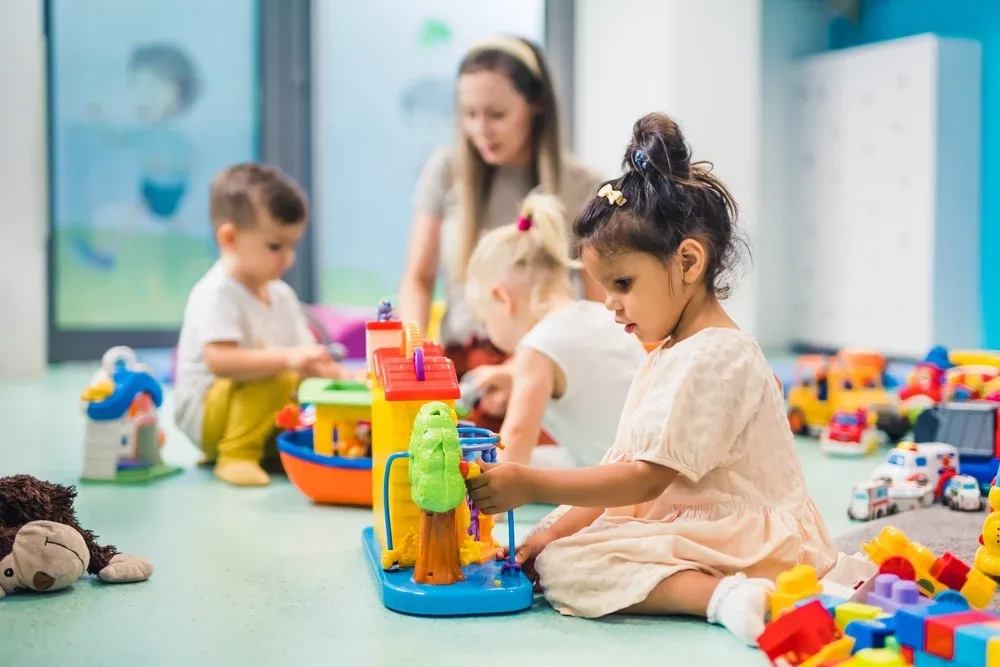
Choosing daycare for your child is a significant decision that can profoundly influence their development. From enhancing social skills to supporting cognitive and emotional growth, daycare can provide a structured environment that fosters early learning and development. In this guide, we’ll explore how daycare affects child development and why it can be a positive choice for your child’s early years.
Contents
Social Development: Making Friends and Learning Social Norms
In daycare, children are exposed to group settings where they learn essential social skills. These include sharing, cooperation, and understanding boundaries. Daily interactions with peers teach kids how to communicate, resolve conflicts, and build friendships.
Learning Through Play
Structured and unstructured play in daycare settings provides opportunities for children to practice social roles, understand social cues, and develop empathy. Group activities like storytelling, games, and role-playing also contribute to social learning.
Real-Life Example
Imagine a group of toddlers engaged in a pretend-play scenario at a daycare. They negotiate roles, such as who will be the ‘doctor’ and who will be the ‘patient,’ learning to take turns and understand others’ perspectives in the process.
Cognitive Development: Stimulating Young Minds
Educational Programs and Activities
Daycares often implement curriculum-based activities that stimulate cognitive development. These activities include puzzles, storytelling, arts and crafts, and early math games, which enhance problem-solving skills and creativity.
Language Development
Regular interaction with caregivers and peers promotes language development. Children learn new vocabulary, sentence structures, and communication skills through daily conversations and guided reading sessions.
Routine and Structure
Daycares provide a structured routine that helps children develop a sense of time and order. This predictability fosters a safe learning environment where children can focus on exploring and understanding new concepts.
Scientific Insight
According to research from the National Institute of Child Health and Human Development, children in high-quality daycare programs tend to have better language and cognitive skills compared to those in lower-quality settings or informal care.
Emotional Development: Building Confidence and Independence
Daycare environments teach children to manage their emotions. They learn to express their feelings, cope with separation from parents, and handle frustration or disappointment constructively.
Developing Independence
In daycare, children engage in activities independently or in small groups, which helps build their self-esteem and sense of autonomy. They learn to make decisions, solve problems, and take responsibility for their actions in a supportive setting.
Supportive Relationships
Caregivers in daycare provide emotional support, helping children feel secure and valued. Positive reinforcement from caregivers and peers builds confidence and encourages emotional growth.
Real-Life Example
Consider a child who initially struggles with separating from their parent at drop-off. Over time, with supportive caregivers and engaging activities, the child gradually becomes more comfortable and looks forward to interacting with friends, showing increased confidence and emotional resilience.
Physical Development: Encouraging Active Play
Daycares offer activities that promote fine and gross motor skills. From drawing and building blocks to running and climbing, children engage in physical activities that enhance their coordination, balance, and overall physical health.
Healthy Habits
Many daycares incorporate routines that encourage healthy habits, such as regular outdoor play, nutritious snacks, and personal hygiene practices. These habits contribute to a child’s overall well-being and physical development.
Activity Example
Outdoor playgrounds and indoor gyms at daycares provide ample opportunities for children to engage in physical activities. Climbing, jumping, and playing sports not only keep them active but also teach them the importance of physical exercise.
Parental Tips for Choosing the Right Daycare
Selecting a daycare involves more than just finding a convenient location. Here are some key factors to consider:
Research and Reviews
– Look for daycares with positive reviews and feedback from other parents.
– Check for accreditation and quality ratings.
Visit and Observe
– Visit the daycare to observe interactions between caregivers and children.
– Note the cleanliness, safety measures, and overall environment.
Curriculum and Activities
– Inquire about the curriculum and types of activities offered.
– Ensure they provide a balance of educational and recreational activities.
Caregiver Qualifications
– Ask about the qualifications and training of the caregivers.
– Ensure they have experience and a genuine interest in child development.
Safety and Security
– Verify the daycare’s safety policies and emergency procedures.
– Ensure secure access to the facility and a safe environment for children.
FAQs
What are the benefits of daycare for toddlers?
Daycare offers socialization, structured learning activities, and opportunities for children to develop independence and emotional resilience.
How does daycare influence language development?
Through interactions with caregivers and peers, children in daycare are exposed to new vocabulary and language patterns, which enhances their communication skills.
What should I look for in a good daycare center?
Look for positive reviews, a balanced curriculum, qualified caregivers, a safe environment, and policies that align with your child’s developmental needs.
Can daycare negatively affect a child?
While high-quality daycare generally supports positive development, inconsistent or poor-quality care can lead to issues such as behavioral problems or insecurity. It’s essential to choose a reputable daycare.
How can I prepare my child for starting daycare?
Gradual introduction, familiarizing your child with the daycare setting, and establishing a routine can help ease the transition.
Conclusion
Daycare can have a profound impact on child development, offering a blend of social interaction, cognitive stimulation, and emotional support. By choosing a high-quality daycare, parents can provide their children with a nurturing environment that fosters growth across various developmental domains. Remember to research thoroughly, visit potential daycares, and choose one that aligns with your child’s needs and your family’s values.
Are you ready to give your child the best possible start in life? Enroll them in DeeCyDa Daycare’s Infant Care Program today and experience the difference firsthand. Our team is committed to giving infants the love, care, and attention they need to thrive. Focusing on nurturing social, emotional, and cognitive development, our Daycare Program sets the stage for a lifetime of success. If you’re searching for “daycare near me” or “daycare in Irvine,” look no further than DeeCyDa Daycare for a trusted and reputable childcare option. Contact us today!
Reference: Growing Up in Child Care

